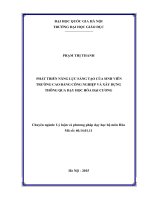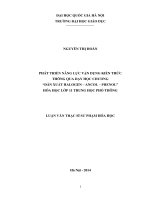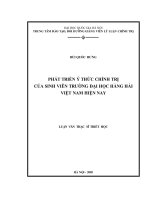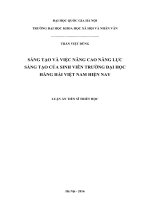PHÁT TRIỂN NĂNG LỰC NGỮ DỤNG CỦA SINH VIÊN TRƯỜNG ĐẠI HỌC NGOẠI NGỮ, ĐẠI HỌC QUỐC GIA HÀ NỘI
Bạn đang xem bản rút gọn của tài liệu. Xem và tải ngay bản đầy đủ của tài liệu tại đây (1.32 MB, 11 trang )
<span class='text_page_counter'>(1)</span><div class='page_container' data-page=1></div>
<span class='text_page_counter'>(2)</span><div class='page_container' data-page=2>
<i> </i>
T¹p chÝ Khoa häc và Công nghệ
S ĐẶC BIỆT CHÀO MỪNG KỶ NIỆM 10 NĂM THÀNH LẬP
KHOA NGOẠI NGỮ - ĐẠI HỌC THÁI NGUYÊN (2007 – 2017)
Môc lôc
Trang
TS. Lê Hồng Thắng - Bàn về dạy-học ngoại ngữ qua đề án dưới góc độ của giáo học pháp 3
Nguyễn Thị Như Nguyệt, Chu Thành Thúy - Đánh giá năng lực đầu ra tiếng Nga của sinh viên trình độ
A2-B1 theo khung tham chiếu chung châu Âu tại Khoa Ngoại ngữ - Đại học Thái Nguyên 7
Nguyễn Thùy Linh - Kiểm tra đánh giá trong giảng dạy các môn đề án ngôn ngữ - một số chia sẻ từ thực tế 13
Vũ Thị Thanh Huệ - Nhận thức của sinh viên đối với khóa đọc mở rộng trực tuyến với sự trợ giúp của mạng xã
hội Edmodo 19
Mai Thị Thu Hân, Nguyễn Thị Liên, Hoàng Thị Tuyết, Dương Thị Ngọc Anh - Tăng cường tính tự học bằng
dự án học tập - nghiên cứu tình huống tại trường Đại học Hoa Lư 25
Dương Đức Minh, Dương Lan Hương - Nghiên cứu về sự tương tác giữa người thuyết trình và khán giả khi học
<i>kỹ năng thuyết trình của sinh viên chuyên ngành tiếng Anh tại Khoa Ngoại ngữ - Đại học Thái Nguyên </i> 31
Phạm Thị Kim Uyên - Sử dụng nhật ký trong dạy biên dịch cho sinh viên chuyên ngữ Đại học Nha Trang 37
Lê Thị Hồng Phúc - Phản hồi của sinh viên về dự án TV show lấy điểm cuối kỳ trong khóa ngữ âm 43
Hán Thị Bích Ngọc - Dạy học ngoại ngữ bên ngoài lớp học - ứng dụng mạng xã hội facebook trong dạy và học
tiếng Anh 49
Nguyễn Ngọc Lưu Ly, Quách Thị Nga - Vài nét về việc sử dụng truyền thông đa phương tiện trong giảng dạy
tiếng Trung Quốc trình độ sơ cấp tại Khoa Ngoại ngữ - Đại học Thái Nguyên 55
Lê Thị Hòa, Đậu Thị Mai Phương - Nâng cao kỹ năng thế kỷ 21 trong học tiếng Anh chuyên ngành thông qua
dự án 61
Nguyễn Thị Bích Ngọc, Trần Minh Thành - Phương pháp gia tăng hiệu quả của đề án tạp chí tiếng Anh trong
việc học viết cho sinh viên chuyên ngành tiếng Anh tại Khoa Ngoại ngữ - Đại học Thái Nguyên 67
Hoàng Thị Huyền Trang, Nguyễn Thị Ngọc Anh - Phát triển khả năng đọc hiểu tiếng Anh cho sinh viên ngoại
ngữ thông qua các bài đọc có nội dung bao hàm yếu tố văn hóa phù hợp 73
Nguyễn Quốc Thủy,Nguyễn Thị Đoan Trang - Dạy - học ngoại ngữ qua đề án tạp chí tại trường Đại học Sư
phạm – Đại học Thái Nguyên 79
Nguyễn Tuấn Anh - Thiết kế tổ chức dạy học mơn báo chí trực tuyến theo hướng học ngôn ngữ qua dự án như
một cách đảm bảo tính đa ngành của chương trình đào tạo 85
Đỗ Thị Sơn, Đỗ Thị Phượng - Nghiên cứu phân tích lỗi sai của sinh viên Khoa Ngoại ngữ - Đại học Thái
Nguyên khi dịch trực tiếp từ Hán Việt sang tiếng Trung Quốc và giải pháp khắc phục 91
Trần Đình Bình - Ứng dụng phương pháp dạy học qua dự án trong dạy học ngoại ngữ ở Việt Nam 97
Lê Thị Khánh Linh, Lê Thị Thu Trang - Phương tiện biểu đạt thái độ của người kể chuyện trong các chương
<i>trình talk show của Mỹ và Việt Nam </i> 103
Đỗ Thanh Mai, Phùng Thị Thu Trang - Ứng dụng Moodle trong dạy và học trực tuyến học phần tin học đại
cương tại Khoa Ngoại ngữ - Đại học Thái Nguyên 109
Mai Thị Ngọc Anh, Vi Thị Hoa, Phạm Hùng Thuyên - Vận dụng phương pháp dạy học theo dự án trong giảng
dạy môn tiếng Trung du lịch tại Khoa Ngoại ngữ - Đại học Thái Nguyên 117
Trần Thị Hạnh - Nhận thức của sinh viên về việc ứng dụng Edmodo như một công cụ phụ trợ trong học tập 123
Bùi Thị Ngọc Oanh - Cải thiện kỹ năng nói của sinh viên khơng chun trình độ A2 với dạy học qua đề án 129
Journal of Science and Technology
174
(14)
</div>
<span class='text_page_counter'>(3)</span><div class='page_container' data-page=3>
Nguyễn Hạnh Đào, Đinh Nữ Hà My - Nghiên cứu tình huống về những khó khăn với người học và điều cần
lưu ý khi giảng dạy môn tiếng Anh chuyên ngành áp dụng phương pháp học qua dự án 135
Nguyễn Thị Kim Oanh - Sử dụng đường hướng học tập theo dự án cho môn học tiếng Anh chuyên ngành tại
Viện Ngoại ngữ, Đại học Bách Khoa Hà Nội: lợi ích, thách thức và đề xuất 141
Vũ Thị Kim Liên - Phát triển năng lực ngữ dụng của sinh viên trường Đại học Ngoại ngữ, Đại học Quốc gia
Hà Nội 147
Đàm Minh Thủy - Tích hợp kỹ năng trong học ngoại ngữ thơng qua dự án làm video “Tìm hiểu ảnh hưởng của
văn hóa Pháp tại Việt Nam” 153
Nguyễn Thị Thu Hoài - Thực trạng thực tập giảng dạy tiếng Anh ở một số trường THPT tại thành phố Thái
<i>Nguyên và các đề xuất giải pháp </i> 159
Nguyễn Thị Ngọc Anh, Hoàng Huyền Trang - Khảo sát lỗi sai của sinh viên Trung Quốc khi học tiếng Việt
tại Khoa Ngoại ngữ - Đại học Thái Nguyên và những đề xuất khắc phục 165
Quách Thị Nga, Đỗ Thị Thu Hiền - Những vấn đề tồn tại của giáo trình đối dịch Trung - Việt ở Việt Nam hiện
nay và giải pháp khắc phục (khảo sát tại Khoa Ngoại ngữ - Đại học Thái Nguyên) 171
Phan Thanh Hải - Hướng tới một chương trình đào tạo cử nhân sư phạm tiếng Anh dựa trên các đề án học tập
trong đào tạo đại học định hướng thực hành ứng dụng nghề nghiệp 177
Lê Vũ Quỳnh Nga, Lý Thị Hoàng Mến, Nguyễn Thị Thu Oanh - Nâng cao chất lượng bài dịch của sinh viên
Khoa Ngoại ngữ - ĐHTN thông qua việc áp dụng phương pháp học tập hợp tác 183
Đoàn Thị Thu Phương - Phong cách học ngoại ngữ của học sinh lớp 11, Nam Định 189
</div>
<span class='text_page_counter'>(4)</span><div class='page_container' data-page=4>
Vũ Thị Kim Liên Tạp chí KHOA HỌC & CƠNG NGHỆ 174(14): 147-152
147
ENHANCING PRAGMATIC COMPETENCE OF STUDENTS
AT UNIVERSITY OF LANGUAGES AND INTERNATIONAL STUDIES, VNU
Vu Thi Kim Lien*
<i>University of Languages and International Studies - VNU </i>
SUMMARY
In an attempt to help students improve their pragmatic competence, specifically argumentation
skills, including giving opinions, showing agreements and disagreements, this action research was
carried out. The action research project was carried out in 12 weeks with the subjects of 25
first-year students from Faculty of English Language Teacher Education, University of Languages and
International Studies. Initial data showed that the majority of students had poor argumentation
competence, in other words, they failed to produce effective opinions, agreements and
disagreements. In addition, most of them often used the language functions which are of
elementary level to express their opinions, agreements and disagreements. Therefore, the
researcher implemented an action plan in which students were trained in terms of argumentation
skills and language functions to express argumentation. The analysis of the pre-data and post-data
showed that students made significance improvement in argumentation skills and language
functions by the end of the projects.
<i>Keywords: Pragmatic competence; Opinion-giving skill; Language functions; agreement; disagreement </i>
INTRODUCTION *
In order to gain communicative competence,
one should be both linguistically and
pragmatically competent [1, p.22]. Pragmatic
competence, in broad sense, is a combination
of the linguistic and social aspects of the
language in which people need to be
competent, and realize success in
communication. In fact, it is concluded that in
order for one to become a proficient and
successful L2 speaker, the mastery of both the
social usage of a language and linguistic
forms are of the similar significance [2, p.52].
However, L2 learners often develop
grammatical competence in the absence of
pragmatic competence. At the University of
Languages and International Studies (ULIS)
where the researcher is teaching, students are
not aware of the role of pragmatics in
communication and tend to focus only on the
accuracy of language form and propositional
meaning of the utterance but not on the
appropriateness of language use and the
speakers’ intention underlying the utterance.
As a result, the researcher decided to carry
*
<i>Tel: 0987388624; Email: </i>
out this research which aims at developing
students’ pragmatic competence, specifically
opinions giving skill via the use of different
classroom activities such as role-play,
discussion, information gap and so on.
This action research project aims at using
classroom speaking activities to improve
students’ pragmatic competence, specifically
their ability in giving opinions, showing
agreements and disagreements and support
them with adequate details and examples.
Moreover, their use of various expressions in
giving opinions, showing agreements and
disagreements are also of significance
concern. The study also investigates the
influence of these activities on students’
pragmatic competence, specifically
argumentation skills including giving
opinions, showing agreement and
disagreement as well as their reactions
towards these activities.
For the purpose of this study, the following
questions are addressed:
</div>
<span class='text_page_counter'>(5)</span><div class='page_container' data-page=5>
Vũ Thị Kim Liên Tạp chí KHOA HỌC & CƠNG NGHỆ 174(14): 147-152
148
2. How do students respond to these changes
of their opinion-giving competence?
RESEARCH METHODOLOGY
This research was carried out at Division 1,
Faculty of Language Teacher Education,
University of Languages and International
Studies, Vietnam National University in
Hanoi. The length of the research is 12
weeks long.
The participants of this study include 25
first-year students at Faculty of English Language
Teacher Education, University of Languages
and International Studies. These students are
all in the same class with the major of English
Linguistics. Their starting English level is
rather equal because they have all taken the
entrance exam with English scores ranging
from 8.0 to 9.0.
The researcher then organized a 12-week long
training session to equip students with
argumentation skills and argumentation
language expressions.The training included
half of the time for lexical instruction. The
lexical training focused partly on
conversation strategies, teaching students
fillers and hesitation devices, so that they
could gain time when a difficulty in
communication occurs. In addition, students
were taught about language functions or
pragma-linguistic markers which are the
language or phrases that they will use when
expressing their opinions, showing
agreements or disagreements. The phrases are
divided into different levels from elementary
to advance and students are trained through
each level gradually. The second training is
for argumentation skills. The teaching of
argumentation skills started with the
definition of arguments, facts, and opinions.
This activity helps them understand the
structure of an argumentation. In addition,
students were also guided on the problems
that they often face when dealing with
argumentation. Then, students were instructed
to formulate arguments and support them,
paying a special attention to the ordering of
supportive statements. A further unit
introduced the notion of refutation or in other
words, counter-argument, to the students, and
how they can use it in argumentation. Finally,
students had the opportunity to practice these
skills in a problem-solving activity. Both
lexical and argumentation skills training were
alternated every week so that students could
master both the skill and language for
performing best in argumentation.
After that, post-data was collected to assess
the results of the action research procedure.
Data was collected by means of survey
questionnaires, tests and classroom
observations. Initial data collected at the
beginning of the research showed that the
majority of students had poor argumentation
competence, in other words, they failed to
produce effective opinions, agreements and
disagreements. In addition, most of them
often used the language functions which are
of elementary level to express their opinions,
agreements and disagreements. Therefore, the
researcher implemented an action plan which
was carried out in 12 weeks when students
were trained in terms of argumentation skills
and language functions to express
argumentation.
The data collection instruments deployed in
this study are questionnaire, tests and
observations, these are helpful for an action
research model [3, p.45].
</div>
<span class='text_page_counter'>(6)</span><div class='page_container' data-page=6>
Vũ Thị Kim Liên Tạp chí KHOA HỌC & CÔNG NGHỆ 174(14): 147-152
149
Oral expression teachers may use this type of
speaking activities in order to urge the EFL
students’ interaction in the classroom. This
type of activities can attract the students’
interests; since, it is presenting new
information. Especially, if the topic being
discussed is interesting for the EFL students
[5, p.30].
Surveys Activities: it involves the students’
participation in carrying out questionnaire
about a specific topic. It requires the
participation of more than one student;
furthermore, it involves the students’
movements inside the classroom.
Oral expression teachers may use this type of
speaking activities to urge the EFL students to
interact in classrooms. It is a unique activity;
since, it requires the EFL students’
movements inside the classroom in order to
communicate with each other [6, p.110].
Discussion Activities: it involves the students’
discussion about a specific topic. It also
requires the participation of more than one
student because they are going to exchange
their points of views about the topic.
It is one of the most widely used speaking
activities that oral expression teachers often
make use ofin teaching English language. The
teacher introduces the topic then urges the
EFL students to interact with each other by
exchanging their point of view [7, p.40].
Role-Play Activities: it involves the students’
participation to play roles according to
different social situations. For instance,
teachers may ask the students to play a role of
guest at a party.
Oral expression: teachers may suggest social
situations and ask the EFL students to play a
particular role in those situations. This type of
activities is also used in teaching speaking
skill to the EFL students.
These are the speaking activities in which
teachers may use oral expression in the
classroom. In another way of classification,
Siham, suggests two approaches to enhance
students’ pragmatic competence [8, p. 25].
Awareness raising activities: are the
activities that aim to raise the pragmatic
awareness of the EFL students about the
target language by using illustrations. Those
illustrations can be presented through the
similarities and differences between the
pragmatic norms of the first and the target
language. They add that “It is worthwhile to
keep in mind that all languages have
pragmatic systems, and with a little
encouragement all learners will recognize that
their L1 is also have “secret rules”.
Furthermore, the use of authentic language
samples will be beneficial in presenting
English language pragmatic norms.”
Oral expression: teachers should use the
speaking activities which can expose the
pragmatic norms of English language.
Through the use of the authentic language
samples, and the comparison between the
pragmatic norms of the EFL students’ first
language and the pragmatic norms of the
target language, oral expression teachers try
to develop the EFL students pragmatic
competence.
Interpretation or production activities: are
activities that come after the presentation of
English language pragmatic norms. It
arranges opportunities for the students to
practice the pragmatic norms.
</div>
<span class='text_page_counter'>(7)</span><div class='page_container' data-page=7>
Vũ Thị Kim Liên Tạp chí KHOA HỌC & CÔNG NGHỆ 174(14): 147-152
150
RESULT AND DISCUSSION
In this part, the researcher provides a
presentation and discussion of all the data
which were collected in the action research,
including the pre-data, post-data and data
during the time when the action research was
implemented. Initial data composes of the
pre-questionnaire and pre-test, which aim to
identify students’ problems related to
argumentation skills. Before the
implementation of the research, the researcher
asked the students to complete a questionnaire
and take part in an oral test to examine their
existing pragmatic competence. The analyzed
data shows that, before the action research
was implemented, the majority of students
failed to perform appropriately with
argumentation skills, and they seemed to use
the language functions of low levels. During
the process of the action research, the
research also collected data via classroom
observation to see how students reacted to the
classroom activities designed to help them
improve their argumentation competence as
well as their performance in these class
activities. Data shows that students were
interested in the activities and showed high
level of involvement in them. Gradual
progress was witnessed from the beginning
until the end of the research cycle. Finally,
post-data as well as the comparison of
pre-data with post-pre-data shows how students have
improved their argumentation competence.
The positive results show that students have
benefited from this action research project as
by the end of the training course, more
students were able to perform complicated
argumentation skills and use more language
functions of higher levels.
Initial data was collected via the use of oral
pre-test. In the oral pre-test, students
performed individually by talking with the
researcher in an oral test which lasts about
5-10 minutes for each student. The oral test was
recorded for later analysis. The researcher
introduced the situation to the students, stated
clearly that, in this situation, students would
have to defend their choices by giving
opinion, support for the opinion, making
counter claims and support for the counter
claim. The designed script is changeable,
which means the researcher was flexible in
developing the conversation, basing on
students’ responses.
In the test, students were encouraged to
develop the conversation as long as possible
to make their opinion the most persuasive.
Therefore, some students may use more than
one turn to produce the functions. For
examples, many students used 2 or 3 turns to
make counter-claims, that’s why the number
of counter-claim is 33, more than the number
of students. However, only 66% of students
could make counter-claims and some still
failed to do that. This means some students
are competent and they can make more
counter-claim but some failed to make any of
that. Considering the claim, all students could
clear out their opinion by making claims,
which is quite easy to explain because this
seems to be the easiest task for them. Only 14
students (56%) could make
counter-arguments, which are the opposition of
counter-claim to defend their opinion. The
number of support for each type is even lower
as many students did not know how to make
support or they were not aware that they had to
do so. Therefore, only 16, 11, and 8 support for
claim, counter-claim and counter-argument
were made respectively.
</div>
<span class='text_page_counter'>(8)</span><div class='page_container' data-page=8>
Vũ Thị Kim Liên Tạp chí KHOA HỌC & CƠNG NGHỆ 174(14): 147-152
151
Final data shows that students’ argumentation
skills have been improved since the number
of statements for each type increased
considerably. Specifically, 100% of the
students could make claims, which means that
they could give their own opinion. This
number is similar to that in the oral pre-test.
92% of them could produce counter-claim,
increasing 26% compared to the pre-test. The
biggest improvement can be seen in support
for counter arguments, which increased up to
42%. This means that students are more
confident and capable of dealing with the
skills which they considered difficult or
impossible for them.
Not only the number of statements increased
but the level of the language expressions used
by students also showed great improvement. In
other words, more students could use phrases of
higher levels.
The results also show that most students had
positive viewpoints towards their changes in
argumentation competence. For example, the
number of students who agreed with the
statements showing that they feel more
confident when talking to native speakers or
taking part in real-life activities which need
argumentation skills account for 44% and
32% respectively. Some students feel that
their skill is good enough, but they still want
to improve it, so that they can later take part
in every social and academic activities which
need argumentation skills.
CONCLUSION
The research shows positive findings as the
majority of students had significant progress
after the training course. They now can fulfill
different skills of making argumentation such
as giving persuasive claim, making strong
support, and counter-argument. In terms of
language used, many of them can use the
expressions of higher level such as
upper-intermediate or advanced, which are often
more complex and require higher level of
language competence. In addition, in making
disagreement, they do not make direct and
blunt statements as before. Instead, they know
how to make use of the hedge to make them
sound more polite and professional. Students
also show positive attitude towards the
results. Specifically, most of them agreed that
the progress made thanks to this action
research helped them a lot in becoming more
confident in authentic communication and
taking part in more formal argumentation.
REFERENCE
<i>1. Herr, K., & Anderson, G. L. (2014), The action </i>
<i>research dissertation: A guide for students and </i>
<i>faculty, New York: Sage publications. </i>
2. Glaser, K. (2009), "Acquiring pragmatic
competence in a foreign language: Mastering
<i>dispreferred speech acts", Topics in Linguistics, </i>
<i>1(4), pp.50-57. </i>
<i>3. Burns, A. (2009), Doing action research in </i>
<i>English language </i> <i>teaching: </i> <i>A </i> <i>guide for </i>
<i>practitioners, London: Routledge. </i>
4. Taguchi, N. (2014), "Cross-cultural adaptability
and development of speech act production in study
abroad", <i>International </i> <i>Journal </i> <i>of </i> <i>Applied </i>
<i>Linguistics, 25(3), pp.343-365. </i>
5. Nozawa, Y. (2015), "The Use of Hedges in
Polite Disagreement by Japanese Advanced
<i>Learners of English", Working Papers of the </i>
<i>Linguistics Circle, 25(2), pp.25-35. </i>
6. Krisnawati, E. (2011), "Pragmatic competence
<i>in the spoken English classroom", Indonesian </i>
<i>Journal of Applied Linguistics, 1(1), pp.105-115. </i>
7. Katz, M. H. (2015), "Politeness theory and the
<i>classification of speech acts", Working Papers of </i>
<i>the Linguistics Circle, 25(2), pp.45-55. </i>
<i>8. Siham, D. (2012), Developing EFL Students’ </i>
<i>Pragmatic Competence through Speaking Skill, </i>
Biskra: University of Biskra.
9. Nguyen, H. T., Fehring, H., & Warren, W.
(2015), "EFL teaching and learning at a
Vietnamese university: What do teachers say?",
</div>
<span class='text_page_counter'>(9)</span><div class='page_container' data-page=9>
Vũ Thị Kim Liên Tạp chí KHOA HỌC & CƠNG NGHỆ 174(14): 147-152
152
TĨM TẮT
PHÁT TRIỂN NĂNG LỰC NGỮ DỤNG CỦA SINH VIÊN
TRƯỜNG ĐẠI HỌC NGOẠI NGỮ, ĐẠI HỌC QUỐC GIA HÀ NỘI
Vũ Thị Kim Liên*
<i>Trường Đại học Ngoại ngữ - ĐH Quốc gia Hà Nội </i>
Nghiên cứu này được tiến hành nhằm giúp sinh viên cải thiện năng lực ngữ dụng học, đặc biệt là
kỹ năng tranh luận, bao gồm đưa ra ý kiến, thể hiện quan điểm đồng ý hoặc phản đối. Dự án
nghiên cứu được tiến hành trong 12 tuần trên đối tượng là 25 sinh viên năm thứ nhất thuộc Khoa
Sư phạm tiếng Anh, trường Đại học Ngoại ngữ, Đại học Quốc gia Hà Nội. Các dữ liệu ban đầu
cho thấy phần lớn học sinh có khả năng tranh luận kém, nói cách khác, họ khơng thể tạo ra quan
điểm đồng ý hoặc phản đối hiệu quả. Hơn nữa, họ thường sử dụng các cụm từ ở mức độ sơ cấp để
trình bày quan điểm đồng ý hoặc phản đối. Do đó, nghiên cứu này đã được tiến hành, trong đó sinh
viên được đào tạo về các kỹ năng tranh luận và cụm từ để diễn tả tranh luận của mình. Kết quả
phân tích dữ liệu trước và sau cho thấy rằng sinh viên đã có những tiến bộ đáng kể về kỹ năng
tranh luận và các cụm từ khi dự án nghiên cứu kết thúc.
<i>Từ khoá: Năng lực ngữ dụng học; trình bày quan điểm; cụm từ chức năng ngôn ngữ; đồng ý; </i>
<i>không đồng ý </i>
<i>Ngày nhận bài: 15/10/2017; Ngày phản biện: 12/11/2017; Ngày duyệt đăng: 13/12/2017 </i>
*
</div>
<span class='text_page_counter'>(10)</span><div class='page_container' data-page=10>
<i>oµ </i>
<i>soT</i>
T¹p chÝ Khoa học và Công nghệ
THE SPECIAL ISSUE FOR THE 10
thFOUNDATION ANNIVERSARY
SCHOOL OF FOREIGN LANGUAGES - TNU (2007-2017)
Content
PageLe Hong Thang – Discussion on Project-Based Learning Approach 3
Nguyen Thi Nhu Nguyet, Chu Thanh Thuy - Students’ Output Competency Assessment in Using Russian
Language at Level A2-B1 on the Basis of Common European Framework of Reference at School of Foreign
Languages, Thai Nguyen University 7
Nguyen Thuy Linh - Evaluation and Assessment in Project-Based Learning - Some Practical Suggestions 13
Vu Thi Thanh Hue - Students’ Perception about an Online Extensive Reading Course with the Help of Edmodo 19
Mai Thi Thu Han, Nguyen Thi Lien, Hoang Thi Tuyet, Duong Thi Ngoc Anh - Fostering Learners’
Autonomy through Project Work in an ESP Class at Hoa Lu University: A Case Study 25
Duong Duc Minh, Duong Lan Huong - A Study on the Interaction between the Presenter and Audience in the
Presentation Skill for English Major Students at School of Foreign Languages - Thai Nguyen University 31
Pham Thi Kim Uyen - Use of Journals in Teaching Translation for English Major Students of Nha Trang University 37
Le Thi Hong Phuc - Students’ Responses to the TV Show Project as the End-of-Term Assessment in the
Pronunciation Course 43
Han Thi Bich Ngoc - Teaching Outside the Classroom - Integrating Social Media into Innovative Language
<i>Teaching: The Case of Facebook </i> 49
Nguyen Ngoc Luu Ly, Quach Thi Nga - Some Features in Applying Multimedia Tools into Teaching
Elementary Chinese in School of Foreign Languages - Thai Nguyen University 55
Le Thi Hoa, Dau Thi Mai Phuong - Fostering the 21st Century Skills in Project-Based ESP Learning 61
Nguyen Thi Bich Ngoc, Tran Minh Thanh - Methods to Increase the English Magazine Project Power in the
Study of the English Written Language for English Major Students at School of Foreign Languages - Thai
Nguyen University 67
Hoang Thi Huyen Trang, Nguyen Thi Ngoc Anh - Developing English Language Reading Comprehension
amongst EFL/ESL Learners through Culturally Relevant Texts 73
Nguyen Quoc Thuy, Nguyen Thi Doan Trang - Teaching Foreign Languages through Magazine Project at
Thai Nguyen University of Education 79
Nguyen Tuan Anh - PBLL Course Development as a Way of Ensuring a Multidisciplinary Program 85
Do Thi Son, Do Thi Phuong - An Analysis of Students’ Errors at School of Foreign Languages, Thai Nguyen
University in Directly Translating from Sino-Vietnamese Words to Chinese and Solutions 91
Tran Dinh Binh - Application of Project-Based Learning in Language Teaching in Vietnam 97
Le Thi Khanh Linh, Le Thi Thu Trang- Evaluative Devices in Personal Narratives from American and
Vietnamese Talk Shows 103
Do Thanh Mai, Phung Thi Thu Trang - The Application of Moodle in E-Learning and Teaching Informatics
at School of Foreign Languages – Thai Nguyen University 109
Mai Thi Ngoc Anh, Vi Thi Hoa, Pham Hung Thuyen - Application of Project-Based Learning to the Teaching
of Chinese Excursion at School of Foreign Languages – Thai Nguyen University 117
Tran Thi Hanh - Students’ Perceptions on the Use of Edmodo as a Supplementary Tool in Learning 123
Bui Thi Ngoc Oanh - Using Project-Based Learning to Improve English Speaking Skills of Non-English Major
Students of Level A2 129
Journal of Science and Technology
174
(14)
</div>
<span class='text_page_counter'>(11)</span><div class='page_container' data-page=11>
Nguyen Hanh Dao, Dinh Nu Ha My - A Participatory Case Study into Learners’ Difficulties and Pedagogical
Implications of Doing Project-Based Learning ESP Course 135
Nguyen Thi Kim Oanh - Project-Based Language Learning Adopted for an ESP Module in School of Foreign
Languages, Hanoi University of Science and Technology: Benefits, Challenges and Recommendations 141
Vu Thi Kim Lien - Enhancing Pragmatic Competence of Students at University of Languages and International
Studies, VNU 147
Dam Minh Thuy - Integrated Skills in Foreign Language Learning via Video Project "Study of the Cultural
<i>Influences of France in Vietnam" </i> 153
Nguyen Thi Thu Hoai - Situation of Intern Teaching Program of English Subject at Some Selected High
<i>Schools in Thai Nguyen City and Suggested Sollutions </i> 159
Nguyen Thi Ngoc Anh, Hoang Huyen Trang - Language Errors of Chinese Students Studying Vietnamese
Language at School of Foreign Languages, Thai Nguyen University and Proposals for Correction 165
Quach Thi Nga, Do Thi Thu Hien - Problems and Suggestions for Chinese - Vietnamese Translation
Textbooks in Vietnam (Investigate in School of Foreign Languages - TNU) 171
Phan Thanh Hai - Toward a Project Based Learning Curriculum for TEFL B.A Program within Profession Oriented
Higher Education 177
Le Vu Quynh Nga, Ly Thi Hoang Men, Nguyen Thi Thu Oanh - Enhancing Students’ Translation
Performance in School of Foreign Languages: An Application of Cooperative Learning 183
Doan Thi Thu Phuong - Language Learning Style Preferences of Grade 11 Students at a High School,
Nam Dinh 189
Dinh Thi Lien, Nguyen Thi Ngoc Anh - The System of Symbols in Then Songs of Tay People 197
</div>
<!--links-->









